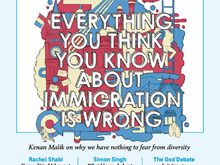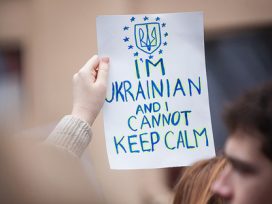As Russia and the EU jostle to gain the upper hand in relations with post-Soviet states, China looks to strengthen its position not only in central Asia but in the buffer zone between Russia and the EU as well. A case of back to the future for Eurasia, argues Adam Balcer.
Articles
Read more than 6000 articles in 35 languages from over 90 cultural journals and associates.
Long ago and far away: Big stories from small countries
Baltic stories in a global context
What’s different about a place is what’s interesting, writes Canadian novelist Antanas Sileika. A proposition that raises all manner of difficulties, as well as presenting unique opportunities, when writing fiction based on Baltic history aimed at a North American audience.
It was impossible to live in this world...
A conversation with Karl-Heinz Dellwo and Gabriele Rollnik
Today, nothing suggests that Karl-Heinz Dellwo and his girlfiend Gabriele Rollnik differ from normality in any important way. They look like a common elderly married couple. They live in a cozy middle-class apartment in the center of Hamburg. They make great coffee and they have a cookbook by Jamie Oliver on the bookshelf in their kitchen. Yet, the appearances are misleading. Their fates have been very dramatic. Karl-Heinz Dellwo, now documentarist and publisher, is a former RAF member who directly participated in the death of two people. Child therapist Gabriele Rollnik is a former member of the anarchist Bewegung 2. Juni. She was involved in several kidnappings and prison break-outs. They both spent many years behind bars. Marek Seckar went to meet with them in Hamburg in order to hear about their past and present.
Today’s slick electoral machines have debased the idea of seeking political power, contends Soundings co-editor Ben Little. Which marks a sea change since the first decades after WWII, when local parties were intensely engaged in candidate selection and struggles over party resources.
Blindspots
On international support for Euromaidan
Leading academics signed an open letter supporting the Euromaidan protests and European values at the turn of 2014. One might have expected a more critical and nuanced position of them, writes Volodymyr Ishchenko. For they ignore the role of the far right in the Ukrainian public sphere at their peril.
The Internet and social media have so far provided a third of Ukrainians with digital connectivity. And, as a new era in Ukranian politics begins, new forms of sharing opinions will surely play their part in the struggle against what can now be called an ancien regime, writes Igor Lyubashenko.

Women's solidarity
The uprising of the Polish women's movement
Poland is the only post-socialist country with a women’s movement worthy of the name, writes Teresa Kulawik. Should it succeed in establishing a transparent structure that can accommodate compromise, Kongres Kobiet could provide a model for the country’s political system.
One of the highlights of Hungary’s EU presidency was the launching of the EU Framework for National Roma Integration Strategies. But a closer look at the situation of the Hungarian Roma provides an alarming picture, writes Yudit Kiss. And more than sufficient reason to head westwards.
Culture as opportunity?
On Sinti and Roma art and culture
Culture work provides Sinti and Roma people with opportunities to develop personally, combat negative modes of representation and intervene politically too. As such, it counterbalances the obstacles that the everyday realities of educational disadvantage and racism create, writes Hamze Bytyci. He takes two surveys on German Sinti and Roma from the past decade as his point of departure for sketching the artistic and cultural landscape, principally in Berlin, surrounding the Sinti and Roma.
Post-Orange Ukraine: Lost years?
A conversation with Tatiana Zhurzhenko
In an interview conducted before Euromaidan commenced, Tatiana Zhurzhenko discusses the intricacies of regional tensions surrounding Ukraine, taking into consideration questions of memory, language and a putative civic, liberal Ukrainian nationalism.

It is wrong to make immigration responsible for Europe’s social ills, writes Kenan Malik. Worse still is the way in which fortress Europe has created not only a physical barrier around the continent, but an emotional one, too, around Europe’s sense of humanity.
Culturally-led urban strategies rely more on selective images of cities than reflecting a socially and ethnically diverse urbanism, writes Malcolm Miles. For, under the surface, it is not civic renewal but economic and commercial motives that drive the cultural city.

Ukrainian civil society wants a truly independent Ukrainian and European nation. And Ukrainians understand that, in order to achieve this independence, they need to completely overhaul the political system. Anton Shekhovtsov on Euromaidan and the rebooting of Ukraine.
Euromaidan and beyond
Preliminary conclusions
Euromaidan is not just about failing to sign the Association Agreement, but Ukraine’s whole development as a country. For 22 years, it has been stuck in a grey zone between post-Soviet autocracies to the east and increasingly democratizing and prosperous neighbours to the west, writes Mykola Riabchuk.
Almost overnight, Ukraine ceased to be a “kingdom in the middle”. Now there are only three options left, writes Ivan Krastev: sign the agreement with the EU, as the majority of Ukrainians want; join Putin’s Eurasia, as the endangered political elite desire; or go bankrupt.